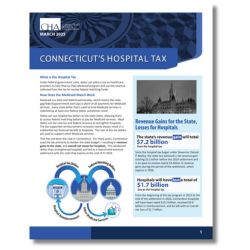As the Connecticut General Assembly reviews state budget proposals involving Connecticut’s hospital tax, the Connecticut Hospital Association (CHA) has developed a two-page educational fact sheet to inform lawmakers, healthcare professionals, and the public. The fact sheet summarizes the hospital tax program, its history in Connecticut, and the 2017 hospital tax settlement with the state.
In his biennial state budget released in February, Governor Ned Lamont proposed rebasing the hospital tax, which would result in a significant tax increase on Connecticut hospitals that would upend seven years of financial predictability and stability enabled by the settlement, accelerate the growth of Medicaid underpayment, and reduce healthcare affordability throughout the system. In particular, Sections 16-18 of SB 1246, An Act Concerning Revenue Items To Implement The Governor’s Budget, would amend the hospital tax and supplemental payment provisions established pursuant to the hospital settlement agreement, providing for an annual increase in the tax and corresponding supplemental payments beginning July 1, 2026. These policies are unsound and will cause irreparable harm to hospitals, patients, employers, and the insured, as CHA detailed in written testimony submitted to the Finance, Revenue and Bonding Committee.
For many years, Connecticut used the tax primarily to bolster the state budget, resulting in revenue gains to the state and overall net losses for hospitals. This weakened rather than strengthened hospitals and led to a lawsuit and eventual settlement with the state that expires at the end of FY 2026. The seven-year settlement gradually reduced the tax burden on hospitals.
Still, from the beginning of the tax program in 2012 to the expiration of the settlement next year, Connecticut hospitals will have lost a total of $1.7 billion, while the state will have gained a total of $7.2 billion.
CHA’s fact sheet on Connecticut’s hospital tax demonstrates that though hospitals are one of the state’s largest providers of tax revenue, the tax program has not done nearly enough to help support the cost of providing hospital services to Medicaid beneficiaries. CHA continues to engage policymakers in discussions to advance better ways to use the hospital tax program to strengthen the care delivery system, ultimately benefitting the state, taxpayers, patients, and the Medicaid providers on whom beneficiaries depend for care.
Click here to read about CHA’s ideas to restructure the hospital tax program to invest in community health and produce long-term healthcare savings.
Click here to download the Connecticut’s Hospital Tax Fact Sheet.





